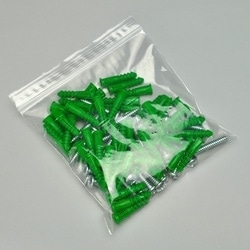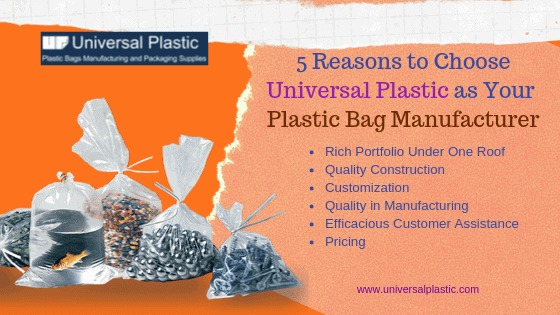
When it comes to choosing plastics bags, two options are often considered: polyethylene (PE) or polypropylene (PP) plastic. Although polyethylene and polypropylene bags are both plastics, they aren't typically used for the same purpose or products. Deciding which type of plastic packaging to use depends on your specific needs and application.
Choosing the best plastic bag type polyethylene bags vs polypropylene bags
 What is a PE (Polyethylene) bag?
What is a PE (Polyethylene) bag?
Polyethylene bags are translucent or opaque with a slight haze to them that allows you to see the items inside, although the details of the contents won't be clear. Polyethylene bags are ideal for packaging goods or items that require a high level of protection. Most industrial companies use polyethylene bags for packing and storing large, heavy items such as industrial machining parts. The main characteristics of polyethylene bags include:
- Translucent or opaque
- Tear resistant
- Flexible
- Durable
- Low abrasion
- Soft and pliable
What is a PP (Polypropylene) bag?
Polypropylene bags are crystal clear, making them ideal for food, the medical industry, or any other industry where consumers need to clearly see a product before making a purchase. The main characteristics of polypropylene bags include:
- Durability
- Corrosion resistant
- Crystal clear transparency
- Pliable at higher temperatures
- Stiff and hard plastic
- High environmental resistance
Before deciding which is the best plastic bag to use, consider your specific business needs, your budget, and how you want to package and present your products to your customers.
PE (Polyethylene) Bags Advantages
Polyethylene has several advantages, including exceptionally high melting and freezing points. It is created by the polymerization of ethylene (or ethene) monomers. Polyethylene is made by the addition or the radical polymerization of ethylene (olefin) monomers. Some of the properties and benefits of polyethylene bags include:
- Inert and translucent, which creates a lower static charge
- Preventing too much light from entering the bag, which protects the contents
- Attracting less dust, dirt, and other undesirable foreign organic elements
- Less costly than polypropylene
- More resistant to cold temperatures and wear and tear
Common types of polyethylene bags include:
- High-density polyethylene (HDPE): Features densely packed and bonded molecules, making this type of polyethylene rigid, robust, and durable.
- Low-density polyethylene (LDPE): LDPE is generated from free radical polymerization, resulting in long and short branching of chains. This type of polyethylene is flexible, with low tensile strength and durability.
- Linear low-density polyethylene (LLDPE): LLDPE is very strong and durable. It boasts a higher tensile strength and durability than the LDPE.
Typical Applications of Polyethylene Bags
Polyethylene bags are used in a variety of domestic and industrial applications, including making pipes, bottles, cans, tubing, plastic film wraps, polythene grocery bags, and much more.
Polypropylene - PP Bags Advantages
Characterized by a more transparent appearance and higher tensile strength, polypropylene bags offer a higher heat and chemical resistance than polyethylene bags. Polypropylene packaging can be made with rigid protective edges, making it ideal for wrapping solutions that prevent scratches to the product or contents. It also offers unmatched protection against moisture, vapors, and debris. Some of the specific properties and benefits of polypropylene bags include:
- More resistance to chemicals, high temperatures, and scratches
- Stiff and hard plastic
- Crystal clear for excellent product presentation
- Unmatched vapor and moisture barrier
- Meeting FDA and USDA specifications and requirements
Typical Applications of Polypropylene Bags
Polypropylene bags are commonly used for food wrapping, electronics manufacturing, and hospitals to keep contents free of contaminants. They are also used for packaging a vast number of consumer products in a wide range of industries and applications, including the automotive industry.
What is the difference between polyethylene and polypropylene bags?
PE bags are more flexible and cost-effective, ideal for industrial and heavy-duty storage, while PP bags offer superior clarity and strength, making them suitable for food, medical, and high-end product packaging. Choosing between them depends on your specific packaging needs.Packaging Solutions by Universal Plastic
Polyethylene and polypropylene poly bags are undeniably the two most commonly utilized packaging solutions. When deciding the best option for your needs, it is crucial to know the advantages that each offer. If you need help choosing the right one, reach out to Universal Plastic today. Our experts will work closely with you to understand your application requirements. Later, we can customize these bags with your brand logo and text for branding and promotional purposes and offer them in the best wholesale prices. Contact us today to discuss your requirements and request a quote.

